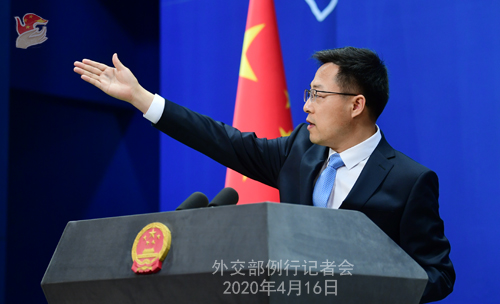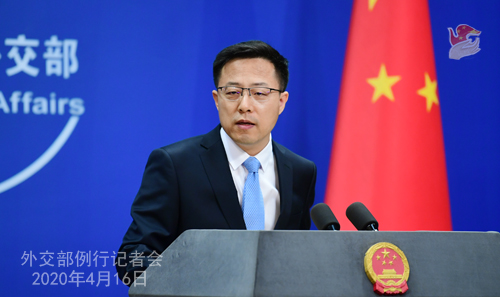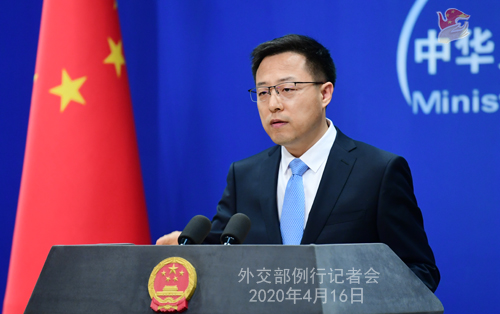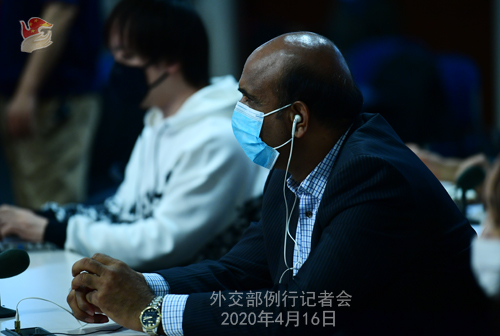| Foreign Ministry Spokesperson Zhao Lijian's Regular Press Conference on April 16, 2020 |
| 2020-04-16 22:29 |
|
CCTV: We noted the Chinese team of medical experts have arrived in Kazakhstan for one week. Could you give us more information about their work there? Zhao Lijian: On April 9, the Chinese government sent a medical team on COVID-19 to Kazakhstan, including more than 10 experts in respiratory disease, critical care, infection, traditional Chinese medicine, nursing and public health, as part of an important measure to implement the consensus reached by the two heads of state on strengthening cooperation in fighting the epidemics. It was the first team that China sent to central Asia, aiming to help Kazakhstan fight the epidemic. Over the past week, along with their Kazakh colleagues, the Chinese experts have been to the frontline including the public health emergency operations center, the national research cardiac surgery center, and designated places for isolation and quarantine. They had exchanges with Kazakhstan's ministry of public health, public health center, medical schools as well as more than 5,000 medical personnel to share experience in screening, clinical diagnosis and treatment, intensive care, epidemic prevention and control, etc. The expert team also held a video link with employees of Chines enterprises and overseas Chinese, including Chinese students, in Kazakhstan. According to the schedule, the Chinese team already left Nursultan for Karaganda and Almaty on April 15 to share experience with medical institutions and experts there. Beijing Youth Daily: On April 15, the US State Department released the Executive Summary of the 2020 Adherence to and Compliance with Arms Control, Nonproliferation, and Disarmament Agreements and Commitments (Compliance Report), in which it accused China of not fulfilling its commitment to nuclear testing moratorium and missile non-proliferation and questioned the voluntary Biological Weapons Convention confidence building measure (BWC CBM) declarations China has submitted. What's your comment? Zhao Lijian: We note the report. In recent years, the US has been making the so-called Compliance Report annually, posturing as a judge or referee to criticize other countries' arms control and non-proliferation measures and style itself as a "model". This is distorting facts and blaming the innocent. China holds that treaties and mechanisms in arms control and non-proliferation are important pillars underpinning international peace, security and stability and should be observed and implemented. With a high sense of responsibility, we fulfill our international obligations and commitments, uphold multilateralism and pursue international cooperation, which contributes to safeguarding the international arms control and non-proliferation regime as well as world peace and security. Our efforts are witnessed by the international community. We refuse to dignify the groundless US allegation with a refutation. Then perhaps we can look at what the US has done in recent years. Under the banner of "America first", it pulled out of the INF and the JCPOA, unsigned the Arms Trade Treaty, and stood in the way of negotiations for a protocol that includes a verification regime to the Biological Weapons Convention. Instead of destroying its chemical weapons stockpile, it sought a comprehensive military build-up, seriously disrupting global strategic equilibrium and stability and hampering international arms control and disarmament process. All these have been condemned by the international community. We urge the US to take a hard look at itself and stop judging others.
Shenzhen TV: The finance ministers and central bank governors of the G20 held a virtual meeting yesterday. They agreed on a plan to relieve the world's poorest countries of debt payments starting from May 1 until the end of the year. How will China implement such a plan? Zhao Lijian: Yesterday, G20 finance ministers and central bank governors discussed and adopted a Debt Service Suspension Initiative for Poorest Countries at a virtual meeting. They agreed that both principal repayments and interest payments will be suspended for over 70 countries, starting on May 1, 2020 until end-2020. They are all least developed countries as defined by the UN and IDA countries currently on debt service. Adhering to the vision of a community with a shared future for mankind and upholding justice while pursuing shared interests, China is committed to providing assistance within its capacity to the poorest countries for their poverty reduction and development. Going forward, China will, in accordance with the consensus of the G20 on debt relief, help the poorest countries concentrate their efforts on fighting the epidemic and supporting economic and social development, and continue to actively participate in international anti-epidemic cooperation through other multilateral and bilateral channels. China calls on multilateral and private creditors to promptly take actions to participate in the Debt Service Suspension Initiative for Poorest Countries and jointly help them tide over the difficulties. RIA Novosti: Fox News reported citing multiple sources that the novel coronavirus was leaked from a lab. I wonder what is China's comment on this publication? Zhao Lijian: China's position with regard to the origin and transmission routes of the novel coronavirus is clear. It is a matter of science on which we should only rely on the findings of scientists and medical experts. I'd like to remind you that the WHO has repeatedly stated that there is no evidence showing the virus was made in a lab. Many renowned medical specialists in the world have also debunked the "lab leakage" theory as not science-based at all. Infectious diseases are common enemies to human beings. The international community can only defeat them with concerted efforts. China will continue to stand in solidarity and render mutual assistance with other countries to jointly overcome the pandemic. APP: Pakistani Foreign Minister Shah Mahmood Qureshi last night called his Chinese counterpart Wang Yi. Do you have more information? Zhao Lijian: China and Pakistan are all-weather strategic cooperative partners. Yesterday, State Councilor and Foreign Minister Wang Yi took a phone call from Pakistani Foreign Minister Qureshi. Foreign Minister Wang said that at a crucial moment in China's fight against the epidemic, President Arif Alvi made a special trip to China to express Pakistan's firm support to Chinese leaders, which China has taken to heart. At present, Pakistan's epidemic situation is also weighing on the minds of the Chinese people. All sectors in China have taken voluntary actions to donate money and supplies and help our Pakistani brothers and sisters to the best of our ability. The Chinese government has provided many batches of assistance in goods to Pakistan, sent a medical team, and held video conferences of experts to share experience in prevention and treatment. We will continue to provide all possible support to Pakistan in accordance with its needs to help Pakistan overcome the epidemic as soon as possible. Pakistan Foreign Minister Qureshi thanked China for its valuable support which has played an important role in Pakistan's prevention and control efforts. Pakistan speaks highly of China's targeted and effective measures in the face of the unprecedented global public health and economic crisis which have led to positive results. Pakistan is ready to work closely with China to deepen the all-weather strategic cooperative partnership in the fight against the epidemic. Stay strong, Pakistan!
South China Morning Post: First, also on the US Compliance Report, the US claims that China may secretly conduct underground nuclear tests. Can you confirm if that's true and offer a comment? Second, the US said it is investigating where the novel coronavirus was leaked from. What's your comment? Zhao Lijian: Regarding your first question, China was among the first group of signatories to the CTBT. It supports the purpose and objective of the treaty, stays committed to the nuclear testing moratorium, and has made important contribution to the work of the Preparatory Commission for the Comprehensive Nuclear-Test-Ban Treaty Organization. Data transmission of the monitoring stations in China has been highly commended by the Technical Secretariat of the Preparatory Commission. In disregard of facts and driven by ulterior motives, the US is leveling irresponsible and groundless allegations against China. About the US government's allegations, even American experts raised doubts. China strongly objects to the unacceptable US accusations. In recent years, the US has stated explicitly in the Nuclear Posture Review report that it will not push for the ratification of the treaty and will even resume underground nuclear explosive testing if called upon to do so. The international community should stay on high alert to this dangerous tendency and urge the US to change course. On your second question, I already responded to that just now. Kyodo News: WHO Director-General Tedros said on April 15 that he regretted the decision of US to halt the funding to the organization. According to reports, leading US scientist groups have issued statement to urge the US to continue to contribute funding to WHO. We also noted that there has indeed been criticism on WHO for not recommending travel restrictions at the early stage of COVID-19 outbreak. What's your response? Zhao Lijian: After the outbreak of COVID-19, WHO said it does not recommend trade or travel restrictions based on science and in accordance with the International Health Regulations and repeatedly explained the ground for such decision. As I understand, in the previous five times when WHO announced Public Health Emergency of International Concern, no travel or trade restrictions were recommended, including during the H1N1 flu outbreak in 2009. I want to stress that dating back to the early stage of the outbreak, WHO repeatedly called on countries to attach great importance to the outbreak and improve preparedness. Recently, WHO released a timetable of COVID-19 response. The UN Secretary-General and many heads of state and international organizations have expressed support for WHO. The UN General Assembly has adopted by consensus a resolution affirming WHO's role. The statement issued by the Extraordinary G20 Summit not long ago also stressed its full support and commitment to further strengthening the WHO's role in coordinating international anti-pandemic action, which also reflected the shared opinion of the international community. I would like to point out that the WHO recommendations were made by the relevant committee in accordance with WHO procedures, which also include the opinion of experts from the United States. Reuters: According to a Reuters report, the US is preventing the IMF from issuing new liquidity in the form of special drawing rights as it doesn't want China and Iran to access the funding. What's your comment? Zhao Lijian: As we've been saying, in the face of the grave threat posed by COVID-19, the international community can only win by working together as a community with a shared future. I would like to stress that international financial institutions are important platforms for cooperation, not political tools in the hands of a few countries. International affairs should be managed through consultation by all members. No individual or country should attempt to impose their own will and rules upon others.
|
| |||||||||||||||
|
|||||||||||||||





